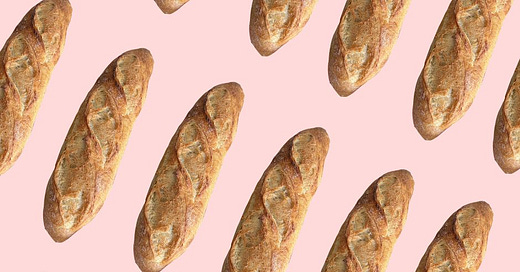The relationship between a Parisian and their local boulangerie is sacred. They will always insist that they know the best one in Paris, and of course, that one just happens to be in their quartier. Could it be possible that every Parisian lives near the best bakery? Bien sûr que non. Some are good, others are average, and anyway both the good and the average are better than what you’ll find in the United States.
Luckily to make the choice of where to go somewhat easier, there are seemingly an infinitesimal amount of competitions for the best pain au chocolat, or eclair, or any other baked good you can imagine. The winners proudly display their ranking on the glass outside the shop. 1er prix aux concours du Meilleur Croissant de Paris 2024 (Maison Doucet, 234 Rue du Faubourg Saint-Antoine, 75012.) 2e Prix, Master national du meilleur pain au chocolat 2024 (Victoire Boulangerie, 12 rue Cadet, 75009 Paris). If it seems a bit ridiculous to you, it is not to the French. Almost everything has a ranking. The prestigious Meilleur Ouvrier de France competition awards medals to a range of professionals including sommeliers, carpenters, estheticians, chocolatiers, electricians, and furniture conservationists among others.
In March, the annual rankings for the Grand Prix de la baguette de la Ville de Paris were released, after analyzing 187 baguettes from across the city. I’m not sure exactly how the winner was decided but as a fan of the classic tartine au beurre, I found it necessary to find out if a baguette could really be good enough to merit an award. If I already like the baguettes I can get down the block, how much different can an awarded baguette be? And so I set out to try the ten best baguettes in Paris.
1. La Parisienne – 12, rue du Faubourg Poissonnière (10e)
2. Aux Délices du Palais – 60, boulevard Brune (14e)
3. Boulangerie Guyot Ferreira – 28, rue Monge (5e)
4. Aux Délices de Glacière – 90, boulevard Auguste Blanqui (13e)
5. La Petite Alsacienne – 45, rue Raymond Losserand (14e)
6. Graine – 74, avenue Gambetta (20e)
7. Le Marquis de Saint-Cyr – 20, boulevard Gouvion Saint-Cyr (17e)
8. Le Délice de Bagnolet – 42, boulevard Mortier (20e)
9. Le Moulin de la Croix-Nivert – 39, rue de la Croix-Nivert (15e)
10. Boulangerie Alexine – 109, avenue de Saint-Ouen (17e)

I started out with Graine for convenience sake. They had an enormous range of pastries that were clearly baked in house (not always the case), gorgeous looking sandwiches, and good looking bread. It looked as if it was going to be rather expensive. Surprisingly, the baguette seemed within normal limits. I also grabbed a chausson aux pommes to meet the credit card minimum of one euro.
Touting my baguette home with pride, I couldn’t wait to try it. It was, afterall, the sixth best in Paris. I tore it open, added some butter, and took a bite. Was it good? Absolutely. Was it life changingly good? No. The chausson aux pommes was excellent, and I’d love to try one of their sandwiches, but I don’t know that I would go terribly out of my way for their baguette.
Over the next few days, I tried La Parisienne and Le Délice de Bagnolet. La Parisienne had a decent baguette, an excellent chausson aux pommes, and some delicious looking sandwiches as well. Like Graine, it was surprisingly close to average in price for the best baguette in Paris. Le Délice de Bagnolet was a more unassuming bakery. I’d actually walked by it before and always assumed that it wasn’t a very good bakery. The pastries and sandwiches look relatively average (and potentially as if they’re made elsewhere). The baguette was pretty good, but it was 5 cents more expensive.
Originally I thought I would try all ten bakeries, but I ultimately decided not to. It was easy to come to a conclusion after just three. The truth is, while not all baguettes are good, all good baguettes are good baguettes. There is very little that can help you distinguish one good baguette from another. Was there a tremendous difference between the “best” baguette and the one from my bakery down the street? Not really.
There is, of course, a logical reason for the similarities between baguettes. First, one has to assume that the baguette purchaser knows which baguette is the correct one to buy, and the correct one is a tradition (or demi-tradition) and not a regular baguette. By French law (Décret n°93-1074 du 13 septembre 1993 pris pour l'application de la loi du 1er août 1905 en ce qui concerne certaines catégories de pains), to be labeled a tradition, a baguette must follow very specific ingredient requirements. A tradition must only contain bread flour,water, salt, sourdough starter, and/or baker's yeast. There are even more minute details about the acceptable rations of flour types. With such specific rules, there is only so much the flavor can vary.
If the ingredients are standardized, and techniques are relatively similar, what then makes for a winning baguette? To a culinary expert, there must be some detectable difference, otherwise such competitions would cease to exist as anything but a marketing gimmick for bakeries. To the consumer, the only true distinction among good baguettes would be how cooked and how fresh the one they’ve just purchased happens to be.
While I had fun testing out different baguettes, I think I will stick to my boulanger du coin for now, unless I’m looking for a fancy sandwich or a nice pastry. A good baguette is a good baguette is a good baguette, eller hur?






Your descriptions made me crave a baguette; alas, Harris Teeter will not pass the “Audrey” test, failed or not!